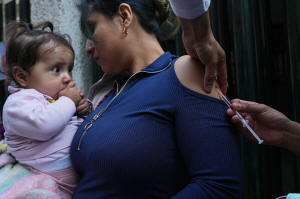Regional health organization issues alert as measles cases surge across
the Americas
[February 05, 2026]
MEXICO CITY (AP) — The Pan American Health Organization, PAHO, issued a
new epidemiological alert following a surge of measles cases across the
Americas, with Mexico reporting the highest numbers. It also called for
urgent vaccination campaigns, highlighting that 78% of recent cases
involved unvaccinated people.
The alert, announced on Wednesday, follows Canada’s loss of measles-free
status in November — a setback the United States and Mexico could soon
mirror. While both governments have requested a two-month extension to
contain their respective outbreaks, the situation is complicated by the
Trump administration’s January withdrawal from the World Health
Organization, the parent agency of PAHO.
Current data is discouraging; the upward trend persists with only months
remaining before the 2026 FIFA World Cup kicks off across the three
North American host nations.
In the first three weeks of 2026, PAHO confirmed 1,031 new measles cases
across seven countries — a staggering 43-fold increase compared to the
same period last year.
While no deaths have been reported thus far, the concentration remains
high: Mexico leads with 740 cases, followed by the United States with
171 and Canada with 67.
The state of Jalisco, in western Mexico, has recorded the country’s
highest incidence rate this year, following last year’s major outbreaks
in Chihuahua and neighboring Texas.
In the United States, public health attention has shifted toward South
Carolina, where cases are rising. In response, the Mexican government
has spent weeks urging the public to receive the two-dose vaccine.

[to top of second column]
|

A health worker administers a dose of the measles vaccine outside a
public hospital in Mexico City, Wednesday, Feb. 4, 2026. (AP
Photo/Marco Ugarte)
 Authorities have even established
mobile vaccination clinics in high-traffic hubs like airports and
bus terminals, while in the capital, Mayor Clara Brugada launched
2,000 new vaccination modules this week.
"Everyone under 49 years of age, please get vaccinated,” Brugada
urged on Tuesday, emphasizing that the vaccine is now accessible
throughout the city. To maximize reach, the new modules are being
stationed outside health centers and within major subway stations,
bringing the campaign directly to the city’s busiest transit
corridors.
PAHO's alert follows a year of sustained growth in measles cases —
the highest in five years — driven by a global resurgence and what
the agency describes as “persistent immunization gaps.”
While adolescents and young adults account for the largest volume of
cases, the highest incidence rates are striking children under the
age of one. The disparity underscores a critical need to reinforce
second-dose coverage.
Regional data is grim: only 33% of countries have reached the 95%
threshold for the first vaccine dose, and a mere 20% have achieved
it for the second.
All contents © copyright 2026 Associated Press. All rights reserved |